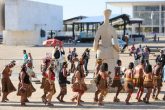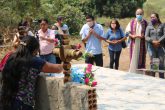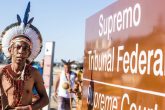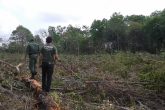Report no. 919: Demonstrations against Belo Monte to be intensified by social movements
Monday and Tuesday, 21 and 22 of June, were marked by sustained protests against the visit of President Lula to Altamira, Pará (PA), in northern Brazil. On Tuesday, hundreds of riverine peoples, environmentalists, members of social movements, students and other social activists opposed to the construction of the Belo Monte hydroelectric dam gathered to express dissatisfaction with the "dictatorial" attitude of the president.
It was an historic moment in the life of the social movements of Altamira. From Monday the 14th until the 21st several meetings were held with the objective of coordinating the actions of protest against the construction of the dam. The moment was most opportune, since Lula came to Altamira to talk about projects like the Luz Para Todos (‘Light for All’ electricity program); paving the Trans Amazonian Highway, BR 163; mining in Marabá; dams on the Tapajós river and the Belo Monte plant.
The movements opposed to these works proposed by the federal government know that the primary objective of the visit would be Belo Monte, one of the great slogans of the Program for Acceleration of Growth (PAC), "which is being pushed down our throats", as the bishop of the Xingu Prelature and president of the Indigenous Missionary Council (CIMI), Don Erwin Kräutler sais. [This in reference to Lula’s promise to not "push it down the throats" of anyone.]
Road Block
Several actions were planned to receive the president and show him all of the dissatisfaction in relation to the Belo Monte dam. On June 21, at about 5 am, about 400 demonstrators, among them inhabitants of Altamira, small family farmers, riverine peoples and representatives of social movements, closed theTrans Amazonian highway at kilometer 18, the Altamira section at Marabá.
During the blockade several banners accused the State of disrespect of the indigenous peoples of the Xingu, who are threatened by growing poverty, violence and environmental problems. The protest ended at 15:00 after the group assessed the message having been delivered and widely reported by national and international press.
On the morning of June 22 with sound cars and prepared for another battle, the protesters resumed the outcry against the plant. The group gathered on the plaza Praça do Matias, on the edge of the Altamira wharf, where they went on to march into the Bandeirão stadium, where the president was to lay the cornerstone of the Luz Para Todos and Belo Monte projects as well as the paving of the Trans Amazonian highway.
Unfortunately, again, the indifference of the government toward the interests of the indigenous peoples became clear. The protesters were prevented from entering the stadium and demonstrating against these projects. "This attitude was further proof of the dictatorial government that we have that does not listen to the population and favors the interests of the few", said Michel Alves, of the Movement of People Affected by Dams (MAB).
Some demonstrators, however, managed to move through the security blockade and the entire police apparatus. They entered the stadium and clearly presented themselves in opposition to Belo Monte, managing to leave the president irritated for a few moments. The group, which was small, only 20 people, delivered the message with a banner that read "We do not want Belo Monte."
For Antonia Melo, the Xingu Forever Alive Movement, Lula’s trip to Altamira to officially announce the plant’s construction was an act of contempt. "Once again the president has shown his preemptive arrogance in dealing with the issues raised by indigenous peoples and other communities that will be affected by the project".
Tight security
The tight security mounted to receive the President and other government agents called attention. The entire security apparatus of Pará was in high profile in Altamira – Federal Police, the National Force, Army, Military and Civil Police and Municipal Guard – not to mention the large number of private security guards who created an isolation cordon to block the arrival of protesters to sites Lula visited.
"What occurred was a tight scheme of repression against our entry. They searched our bags in an authoritarian manner and did not let us enter. Only 20 people, of a group of 400, succeeded in attending the speech by Lula. We were the minority there, but we were firm and strong and able to deliver our message: We do not want Belo Monte" said Melo.
Beyond the police force, the visit also included protection by several militants of the Workers Party (PT) and a helicopter overhead throughout the entire demonstration group with the clear intention to intimidate. The atmosphere was tense and at times there were even shouting matches between militants and protesters.
Next Steps
Wednesday, June 23, social movements, students, teachers, indigenous and riverine communities met to evaluate the events and strategize for future actions against the work. For Melo the actions this week were very positive. "It was one more step in the fight against Belo Monte. We know it’s a battle between David and Goliath, an unequal fight, with the government making use of dirty and dishonest strategies like cooptation, threats, harassment and intimidation, but we will not give up".
The group will intensify the struggle together with the communities, especially those that will be affected. In the coming months they will visit door to door, the families who live there to have a picture of the real situation. For the movements opposed to Belo Monte, the data presented by the government does not correspond to reality.
"We in the social movements are going to continue to pressure the government and, especially, to seek support from society. We continue the resistance, filing suit against the federal Court and agencies that are conniving with such a work, supporting the Lula government in these crimes committed by the construction of Belo Monte", declared Melo.
International Rivers link to contact Ambassadors with letter writing campaign:
http://salsa.democracyinaction.org/o/2486/p/dia/action/public/?action_KEY=3028






